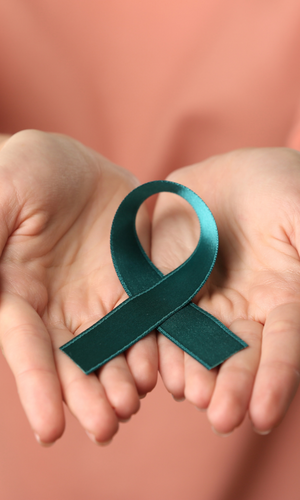Like October Pink for breast cancer, September Turquoise is a campaign to raise awareness of screening for gynecological diseases. We take this opportunity to share with you some information on these female diseases, which we don't talk about that much...
What is the origin of September Turquoise?
Supported by a national association of patients called Imagyn [Initiative of Patients with gynecological cancers], the September Turquoise movement was created in 2014 with the aim of drawing attention to gynecological diseases. Indeed, more than 20% of French women aged 16 to 60 have not benefited from a gynecological follow-up for at least two years. However, it is important to carry out all the examinations and to do the necessary follow-up with a health professional to be able to detect a gynecological pathology at an early stage.
In short, take advantage of doing things that you did not have the opportunity to do before!


What are gynecological diseases?
Gynecological diseases relate to conditions of the female genital system. Gynecological cancers include cancers of theovary, from cervix, of the'endometrium, from vagina and some vulva.
ovarian cancer
Ovarian cancer ranks 8th among female cancers. Ovarian cancer most often results from malignant degeneration of the epithelial cells that line the ovary. It generally develops without manifesting itself by particular clinical signs. Its diagnosis is therefore difficult and often late.
endometrial cancer
Endometrial cancer is the 4th female cancer, the most common gynecological cancer in postmenopausal women. The causes of endometrial cancer are multiple: hormonal, genetic, metabolic (obesity, hypertension)…
Cervical cancer
Cervical cancer is the 12th female cancer in France. It is a malignant tumor developed from the mucous membrane of the cervix. The main risk factor is the prolonged presence of the papillomavirus (HPV) in the cervix.
vulvar cancer
Vulvar cancer is a rare disease: one case per 100,000 women per year, i.e. less than 1,000 cases per year in France in 2018, which represents less than 5 % of female cancers. Vulvar cancer is a malignant tumor that develops mainly from cells of the external genitalia but also from the perineum. In nearly 90% of cases, the disease develops at the expense of the cells of the most superficial layer of the skin.
Vaginal cancer
Vaginal cancer represents 1% of cancer cases in women and is the rarest of gynecological cancers. It is usually a squamous cell carcinoma, occurring most often in women over 60 years old. The most common symptom is abnormal vaginal bleeding. Diagnosis is based on biopsy.
Check with your doctor or gynecologist.
For our health, let's talk about privacy!
Sources:
https://www.icm.unicancer.fr/fr/pathologies/cancers-gynecologiques/cancer-du-vagin
https://www.e-cancer.fr/
